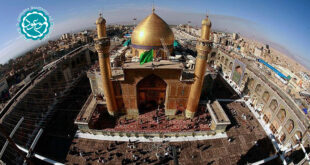6. Divine Wisdom
God is wise. Wisdom [hikmat] has several meanings and identifying them is necessary in order to understand this discourse better:
1. One definition of wisdom is “knowing and understanding the truth of objects”. With respect to the boundless knowledge of God, this definition is correct regarding God, the Exalted; however, it ultimately refers to the knowledge of God. In other words, according to this definition, wisdom is one of the branches of divine knowledge.
2. The second meaning of wisdom is that the acts of an agent are consistent and perfect to the extremity, and far from any faults. According to this definition also, God is wise; meaning that all His actions are realized in the most unimpeachable and perfect manner and are free of any defects or flaws.
As a concise reasoning for the wisdom of God—regarding this definition—we can declare that doubtless, there is a type of congruency and general resemblance between an agent and its action because an action is, in truth, a manifestation of the fundamental nature of the agent and a display of the perfections of its essence. Thus, the action of an agent whose essence is perfect in all aspects, must be perfect in all aspects. In definition of divine wisdom the Commander of the Faithful [Amīr al-Mu’minīn] (‘a) has made the following statements:
“God measured all He created and then secured and stabilized creation.”47
“Through His knowledge He originates His creations and through His wisdom He creates them; without copying or learning from someone or utilizing a sample from a wise creator.”48
An important result of divine wisdom—according to this definition—is deeming this world the best of all possible worlds, because the world, with all its immeasurable expanses, is an act of God and divine wisdom behooves that His actions be as perfect as possible.
3. The third definition of wisdom is eschewal of unrighteous and abhorrent actions. According to this definition, a wise being never commits indecent and evil acts. This definition is also true of God. According to Islamic belief, even though God is able to commit evil acts, His perfect and illimitable essence requires that He be solely a source of good acts. Belief in this type of divine wisdom entails believing that God is pure of committing any act the general intellect of humankind deems evil.
By contemplating this definition, it becomes evident that justice is a branch of this type of wisdom; because, it means that God does not commit any evil act including lying, deceit, perfidy, or injustice.
4. The fourth definition of wisdom is that an agent performs actions according to rational ends and reasonable motives, and refrains from performing useless and futile acts. Therefore, this type of wisdom is the same as finality in deeds, meaning that God is pure of committing useless and purposeless acts and all His deeds are supported by rational intentions.
We humans also perform many of our actions with specific aims, but we must not overlook the fact that there is a fundamental difference between the finality of our deeds and the sagacity of divine acts. Through our volitional and meaningful actions, we generally endeavor to resolve one of our needs or deficiencies and by performing an action, we reach a level of perfection. Thus, the aim of our deeds is resolving needs and attaining perfection. For instance, persons who endeavor to gain knowledge by learning from a master or reading a book are in fact attempting to resolve their need of acquiring knowledge and replace ignorance with understanding to attain an ideal perfection. However, the purpose of divine acts is not attaining perfection. This is because God is absolute perfection and possesses no faults for which to attempt to compensate by carrying out various actions. In fact, the purpose of divine actions is guiding creations to an ideal perfection and the usefulness of these actions is resolving the needs of creatures.
The definition of divine wisdom under discussion is outlined in many Qur’anic verses. For example, regarding the finality of the creation of humans, it states:
“Did you [truly] think that We have created you in vain and that you would not be returned to Us?”49
In this verse, the Qur’an regards the creation of humans as a divine act and states that this act is not futile; rather, it has a sagacious aim. The second part of this verse may be a subtle indication of this aim, meaning that God has created us in order that we utilize our facilities for attaining perfection and bliss and ultimately achieve the results of our actions in the next life.
In another verse, the Qur’an speaks of the sagacity of the creation of the heavens and earth and the creatures in between—which is probably an allusion to the creation of the universe:
“And we have not created the heavens and earth and all that is between for sport.”50
Also, according to a Hadith from Imam Ṣādiq (‘a), in answer to someone who asked “Why has God created His servants?” he stated:
“Verily, God, the Blessed, the Exalted, has not created His creatures in vain and has not forsaken them… and He has not created them for profit or to draw off harm through them; rather, He has created them to bring them profit and to adjoin them with eternal blessings.”51
Divine Wisdom and Evil
Up to this point, it has become clear that in Islamic thought all divine acts are sagacious and have rational purposes, and naturally these purposes pertain to His creations. On the other hand, it cannot be denied that in the world around us, there are affairs which we consider evil; all people are to some extent entangled in calamities and misfortunes caused by natural phenomena such as floods, earthquakes, epidemics, physical pains, mental illnesses, etc. which form an extensive share of evils. However, is the existence of various evils consistent with divine wisdom and the finality of Creation? If the purpose of the creation of humanity is securing their benefits, how can the existence of evil, which is contrary to human good and the purpose of humankind’s creation, be justified?
First, we must realize that the existence of calamities, misfortunes, pain, suffering, and hardships in the world is not void of rational purposes. In fact, these affairs aim to provide the true personal and general good of humanity. It is evident that presenting an in-depth exposition of the philosophy or wisdom behind the existence of evil would require a detailed discussion; however, here we shall concisely enumerate several advantages of the existence of evil in the personal and social lives of humankind.
a) Fulfillment of the Potential of Humanity
Humanity’s nature and the general circumstances of the natural world are such that much of our material and spiritual potential can only be realized through confrontation with hardships and struggling with problems. Just as the muscles of an athlete develop through exhausting and onerous exercise, so also some of humanity’s spiritual and mental abilities emerge only in order to overcome the difficulties of life when faced with trials and tribulations. For instance, many discoveries and scientific inventions have been made in response to the fundamental needs of humankind and in order to solve individual or collective problems.
The Qur’an emphasizes the fact that facility and ease is latent in every hardship and affliction:
“So [know that] truly with hardship there is ease. Yes, verily, with hardship comes ease.”52
In addition, using beautiful analogies Imam ‘Alī (‘a) describes the effects of hardships in developing humanity’s hidden abilities:
“Know that the branches of a tree that grows in the desert are tougher, [while] the membrane of pleasant grass is thinner, and the fires [made] of desert plants are more radiant and they burn longer.”53
b) Divine Trials
One of the general traditions (sunnat) of God is ibtilā’ or trialing. Based on the purposes of our creation and existential characteristics, God tests us in the various contexts of our lives. Of course, it must be kept in mind that divine trials are not carried out by God with the purpose of discovering an unknown; on the contrary, the purpose of this divine act—trialing—refers to His creations—humanity, and the purpose is the development of our innate abilities and emergence of our inner treasures. Humanity, in the process of divine trials, is like an ore that is placed in a fiery furnace in order to separate its impurities and reveal its precious essence. Even so, sometimes divine trials are accomplished through ease and welfare.54 Several Qur’anic verses indicate trialing humans through hardships and affliction, such as:
“And surely we shall try you with something of fear and hunger, and reduction of assets, lives, and produce; and give thou good tidings unto the patient.”55
Regarding God’s purpose in testing His servants through hardships, Imam ‘Alī (‘a) declares:
“As punishment of indecent behavior, God afflicts His servants with reduction of the fruits of trees, withholding rain, and closing off the cascade of blessings so that a repenter repents, and a sinner renounces his sins and a self-edifier becomes edified…”56
c) Awakening
One of the most important consequences of trials and tribulations is that they awaken humans from the slumber of negligence due to our immersion in worldly luxuries; they remind us of our important responsibilities regarding our Lord and transform our arrogance into humility and modesty. As an indication of this fact, the Holy Qur’an declares that the peoples of the prophets have always been confronted with difficulties so that they might renounce their disobedience and surrender to righteousness:
“And We have sent no prophet to any city but that We burdened its people with hardship and affliction that haply they might weep [before Allah and be humble].”57
In addition, the Qur’an states that the calamities and hardships afflicted upon Pharaoh’s nation were admonitions to remind them of the truths they had neglected:
“And verily, we afflicted the people of the Pharaoh with drought and diminution of produce that haply they might be edified.”58
d) Appreciation of Divine Blessings
Another advantage of the existence of evils is that people realize the significance of divine blessings and are thankful for them because, “Only one who has been afflicted can appreciate health and ease”59. Imam Ṣādiq has stated:
“While both the righteous and the wicked are plagued with these blights, God has instituted them as reformation for both. The blights and calamities which befall the righteous cause them to appreciate the past blessings of their Lord and this leads them to thankfulness and patience.”60
So far, we have indicated several advantages and positive results of evil in the lives of humans. Here we shall discuss several general principles whose consideration will facilitate reaching the conclusions of this discourse.

 Mouood Mouood English Edition
Mouood Mouood English Edition



